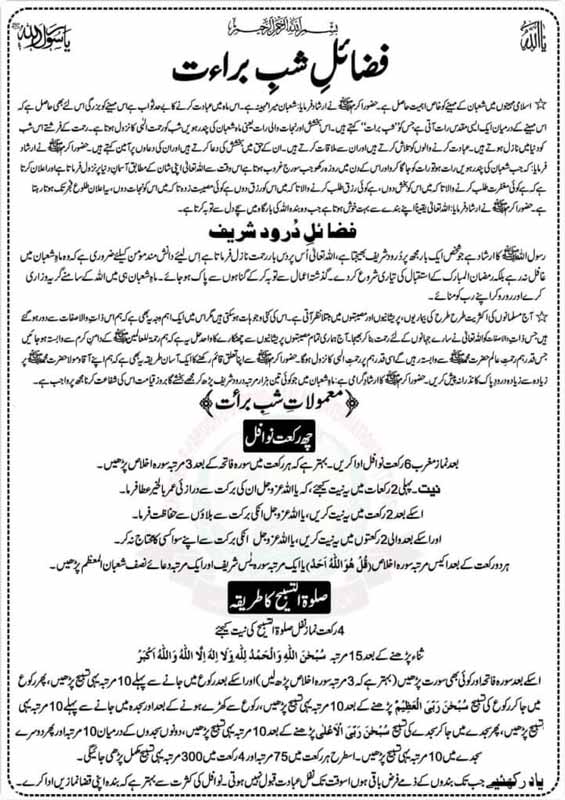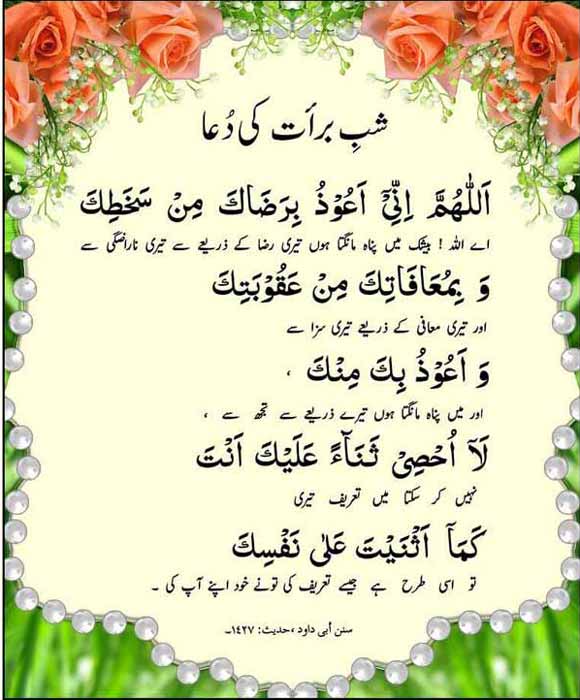Dua For Shaban - Dua for Shab E Barat
Shaban Ki Dua - Shab E Barat Ki Dua - Significance Of Shabaan - Shabaan Ki Fazilat - Significance Of Shab-e-Baraat - Shab-e-Baraat Ki Fazilat - Shabaan month
Dua For Shaban Night | Shaban Ki Dua | Dua for 15th of Shaban
The Night of Shaban, also known as Laylatul Bara’ah, is an important night in the Islamic calendar that falls on the 15th day of the Islamic month of Shaban. It is a night of blessings and forgiveness, and it is marked by special prayers and acts of worship by Muslims all around the world. According to Islamic tradition, the Night of Shaban is a night when Allah forgives sins and showers His mercy upon His servants. It is a time to seek forgiveness for past mistakes, to repent sincerely, and to renew one’s commitment to Allah. Muslims mark the Night of Shaban by performing various acts of worship, such as reciting the Quran, performing extra prayers, and making dua (supplication) to Allah. Some Muslims also fast during the day leading up to the Night of Shaban, as a way to purify themselves and prepare for the night of worship.
One of the most significant acts of worship on the Night of Shaban is the Salatul Tasbih, a special prayer that involves reciting the tasbih, which is a form of glorification of Allah. This prayer is said to be very beneficial in seeking forgiveness and obtaining Allah’s blessings.
Muslims also mark the Night of Shaban by giving charity, visiting family and friends, and performing other good deeds. It is a time to strengthen bonds of brotherhood and sisterhood and to show compassion and kindness to others. In some parts of the Muslim world, the Night of Shaban is celebrated with special customs and traditions, such as lighting candles and decorating homes with lights and flowers. However, it is important to remember that these practices should be in accordance with Islamic teachings and should not be based on superstition or cultural customs. Overall, the Night of Shaban is a special night for Muslims to seek forgiveness, renew their faith, and draw closer to Allah. By performing acts of worship, showing kindness and compassion to others, and seeking forgiveness for past mistakes, Muslims can make the most of this blessed night and prepare themselves for the holy month of Ramadan, which follows shortly after.

Prayers & Duas for 15th Shaban | Shab e Barat Kay Nawafil (Nafil)
Shaban is the eighth month in the Islamic calendar, and it holds a special significance for Muslims around the world. One of the most celebrated events in the month of Shaban is Shab e Barat, which is observed on the night of the 15th of Shaban. On this night, Muslims engage in prayers, supplications, and praise for Allah Almighty.
For many Muslims, Shab e Barat is considered one of the holiest nights in the lunar calendar. It is a time when Muslims make special preparations to pray from dusk to dawn, seeking Allah’s blessings and forgiveness. To earn maximum rewards from Allah, many Muslims also fast the following day. Muslims believe that praying on the night of Shab e Barat takes on special significance, as Allah Almighty blesses the rest of the year and provides a good chance for forgiveness.
According to a narration by Hazrat Ali (RA), Prophet Muhammad (PBUH) said: “When it is the fifteenth of Shaban, then stand (in worship) at night and fast during the day. Because Allah descends in this night at sunset to the first heaven and says: ‘Is there any seeker of forgiveness, that I may forgive him? Is there any seeker of sustenance, that I may sustain him? Is there anyone in affliction, that I may remove his affliction? Is there anyone like this, like that (and so on)’. This continues until Fajr.” (Ibn Majah)
Muslims traditionally read Surah Yasin and make special supplications for good health, protection from calamities, and to increase their faith on the night of Shab e Barat, after Maghrib or Isha prayer. Shab e Barat is a night when Allah Almighty forgives all those who believe in Him and do not harbour hatred towards others. In a Hadith, Prophet Muhammad (SAW) stated: “In the fifteenth night of Shaban, Allah manifests and forgives all His creation except for the Mushrik (idolater) and the spiteful.” (Ibn Majah). There are several ways a Muslim can earn great rewards from Allah Almighty on the 15th night of Shaban by performing different Nawafil prayers and Tasbeehs. Starting from the Maghrib prayer, one can offer 2 Rakats of Nafal by reciting Surah Ikhlas and Surah Falaq in the first Rakat and Surah Naas in the second Rakat, followed by dua for the protection of faith.
Salat Tasbih is another highly recommended Nafal prayer that can bring great rewards. To perform this prayer, one should make an intention for 4 Rakats and recite the Tasbih “Subhanallahi Wal Hamdulillahi Walaa Ilaaha Illallahu Wallahu Akbar” at least 75 times in each Rakat.
Another 2 Rakat Nafal prayers can be offered after the Maghrib prayer by reciting Surah Yasin and Dua Nisf Shaban. Recitation of the Holy Quran and dhikr, such as reciting the durood on Prophet Muhammad (PBUH), is also a beneficial act of worship during this special night. Those who do not believe in the significance of this night, can still perform regular prayers and praise Allah Almighty without disrespecting the beliefs of others who consider this night special. It is important to respect and tolerate the religious practices of others.

Significance Of Shaban | Shaban Ki Fazilat
Shaban is the eighth month of the Islamic calendar and has a special significance in Islam. Some of the significant events and practices related to Shaban are:
The Night of Baraat: The 15th night of Shaban is also known as the Night of Baraat or Laylatul Baraat. Muslims believe that on this night, Allah forgives the sins of the believers and writes their destinies for the coming year. Many Muslims observe this night by spending it in prayer, supplication, and seeking forgiveness.
Preparation for Ramadan: Shaban is considered as the month of preparation for Ramadan, the ninth month of the Islamic calendar when Muslims observe fasting. Muslims often use this month to increase their spiritual and physical readiness for Ramadan by increasing their worship, performing good deeds, and fasting some optional fasts. Birth Anniversary of Imam al-Mahdi: Some Muslims also celebrate the birth anniversary of Imam al-Mahdi, who is believed to be the final Imam in Shia Islam, during the month of Shaban.
Death Anniversary of Abu Bakr: The first Caliph of Islam, Abu Bakr, passed away in the month of Shaban. Some Muslims remember and honor his legacy during this month. Overall, Shaban is a month of increased devotion, preparation, and reflection for Muslims.

Significance Of Shab e Baraat | Shab e Baraat Ki Fazilat
Shab-e-Baraat, also known as Laylatul Baraat or Night of Forgiveness, is a significant event in the Islamic calendar that falls on the 15th night of the Islamic month of Shaban. It is a night of great blessings, mercy, and forgiveness, and Muslims around the world observe it with great reverence and devotion.
According to Islamic belief, on this night, Allah (SWT) forgives the sins of those who repent sincerely and seek His forgiveness. Muslims engage in various acts of worship, including offering prayers, reciting the Quran, giving charity, and seeking forgiveness from Allah (SWT) for their sins. It is also a time when Muslims remember and pray for their deceased loved ones.
Shab-e-Baraat is particularly significant for Sunni and Shia Muslims in South Asia, the Middle East, and other parts of the world, who observe it with great fervor and devotion. Many people stay up all night in prayer and remembrance of Allah (SWT), seeking His forgiveness and mercy. It is also a time for Muslims to reflect on their deeds, seek repentance for their sins, and resolve to live a life of piety and righteousness.
Shab-e-Baraat is a night of great significance in the Islamic calendar, and Muslims observe it with great reverence and devotion. It is a time to seek forgiveness from Allah (SWT), remember the deceased, and reflect on one’s deeds, with the hope of becoming better Muslims and earning the mercy and blessings of Allah (SWT).
